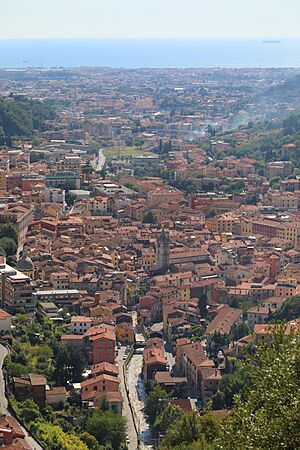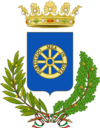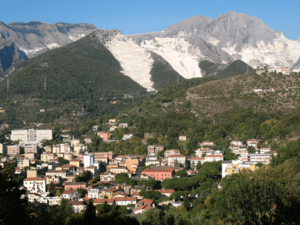Carrara facts for kids
Quick facts for kids
Carrara
Carara (Emilian)
|
|||
|---|---|---|---|
| Comune di Carrara | |||
 |
|||
|
|||
| Country | Italy | ||
| Region | Tuscany | ||
| Province | Massa and Carrara (MS) | ||
| Frazioni | Avenza, Bedizzano, Bergiola, Bonascola, Castelpoggio, Codena, Colonnata, Fontia, Fossola, Gragnana, Marina di Carrara, Miseglia, Nazzano, Noceto, Sorgnano, Torano | ||
| Area | |||
| • Total | 71 km2 (27 sq mi) | ||
| Elevation | 100 m (300 ft) | ||
| Population
(30 June 2016)
|
|||
| • Total | 62,923 | ||
| • Density | 886/km2 (2,295/sq mi) | ||
| Demonym(s) | Carraresi | ||
| Time zone | UTC+1 (CET) | ||
| • Summer (DST) | UTC+2 (CEST) | ||
| Postal code |
54033
|
||
| Dialing code | 0585 | ||
| Patron saint | San Ceccardo | ||
| Saint day | June 16 | ||
Carrara (pronounced ka-RAR-uh) is a town in Tuscany, central Italy. It is famous for its beautiful white or blue-grey marble, which has been dug from the ground there for thousands of years. The town is located by the Carrione River, about 100 kilometers (60 miles) northwest of Florence. Its motto, "My strength is in the wheel," shows how important the marble shipping industry has been since Roman times.
Contents
What's in a Name?
The word Carrara probably comes from an old word, kar, which means 'stone'. This makes a lot of sense because Carrara is so well-known for its stone quarries! The Latin word carrariae also means 'quarries'.
A Look at History
Ancient Times
People lived in the Carrara area as far back as 900 BC. The town itself started when the Romans built homes for workers who dug marble from the quarries. Carrara has been connected to marble quarrying and carving ever since the Roman Age. The marble was shipped from a nearby harbor called Luni.
Middle Ages and Beyond
Over time, Carrara was ruled by different groups, including bishops and powerful families. In the 15th century, Carrara and a nearby town called Massa became the Duchy of Massa and Carrara. This was a small state that lasted for many centuries. Later, it became part of the Duchy of Modena.
During the time when Italy was becoming one country (called the unification of Italy), Carrara was a place where people often protested for change. It was a center for revolutionary ideas.
Workers and Marble
At the end of the 1800s, Carrara became known for its strong worker movements, especially among the quarry workers. These workers, including those who carved stone, had very strong beliefs about fairness and rights. They worked hard to organize and improve conditions in the quarries and carving workshops. In 1968, the International Federation of Anarchists was formed in Carrara.
In 1929, the towns of Carrara, Massa, and Montignoso were joined together into one area called Apuania. But in 1945, they became separate towns again.
What Carrara is Known For
Marble and Art
Carrara marble has been used since the time of Ancient Rome. Famous buildings like the Pantheon and Trajan's Column in Rome are made from it. Many beautiful sculptures from the Renaissance period were also carved from Carrara marble.
Town Symbols
The motto of Carrara is "My strength is in the wheel." This refers to the wheels of the carriages that were used to transport huge marble blocks from the quarries to the ships. The wheel is a symbol of Carrara. The town's coat of arms also features a special wheel, which is a symbol of ancient master stonemasons.
Places to See
- The Cathedral (also called Duomo) was built in the 12th century.
- The Ducal Palace (also known as Palazzo Cybo Malaspina) was built in the 16th century. It is now home to the Fine Arts Academy. This palace was built on top of an older fort.
- The Baroque church and convent of San Francesco were built between 1623 and 1664.
- The Church of the Suffragio was started in 1686. Its front has a large marble doorway in the Baroque style.
- The Sanctuary of the Madonna delle Grazie alla Lugnola was finished in 1676.
- The Church of Santa Maria Assunta, in Torano, has a 16th-century front with a doorway from 1554.
Images for kids
Sister Cities
Carrara is connected with these cities around the world:
 Grasse, France
Grasse, France Ingolstadt, Germany
Ingolstadt, Germany Kragujevac, Serbia
Kragujevac, Serbia Opole, Poland
Opole, Poland Yerevan, Armenia
Yerevan, Armenia Yunfu, China
Yunfu, China
Famous People from Carrara
Many talented people were born in Carrara, including:
- Federico Bernardeschi (born 1994), a footballer
- Gianluigi Buffon (born 1978), a footballer
- Giorgio Chinaglia (1947-2012), a footballer
- Francesco Gabbani (born 1982), a singer
- Lorenzo Musetti (born 2002), a tennis player
- Pietro Tacca (1577-1640), a sculptor
See also
 In Spanish: Carrara para niños
In Spanish: Carrara para niños









